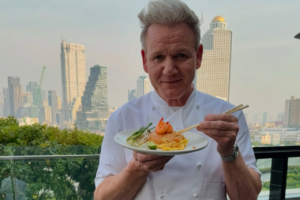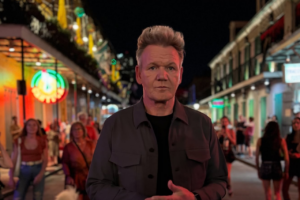In the dimly lit basement of a Fulham restaurant during the early 1990s, the foundation of what would become a culinary empire was being laid, one meticulously prepared dish at a time. The story of Aubergine represents more than just another chapter in Gordon Ramsay’s illustrious career—it marks the crucible where his philosophy of excellence was forged, tested, and refined.
The intensity of those days remains palpable in Ramsay’s recollections. “We had one tiny team,” he recalls, describing the basement kitchen where a brigade of just six chefs worked in synchronized precision for punishing 16-17 hour days. This wasn’t merely about endurance; it was about the pursuit of perfection in every detail, from the way spinach was picked to how shallots were chopped.
The arrival of Angela Harner marked a pivotal moment in the kitchen’s evolution. As the first female chef in the brigade, her presence catalyzed a transformation in the kitchen’s dynamic. With her Cambridge education and quick learning abilities, Harner brought a different energy to the traditionally male-dominated space. Ramsay’s protective instincts toward her—initially insisting she leave early to catch her bus—reveal both the paternal aspects of his leadership style and the genuine care he held for his team’s wellbeing.

What set Aubergine apart wasn’t just its food—it was the restaurant’s ability to deliver excellence at a fraction of the price of its competitors. “We were as good as Nico, Marco, and Pierre Koffmann,” Ramsay notes, “but half the price.” This combination of exceptional quality and relative accessibility created an unprecedented demand, with booking lists extending six to seven months in advance and waiting lists three times the size of available covers each night.
The pressure was immense, but it was precisely this pressure that forged an unshakeable foundation. Under the watchful eyes of critics and competing chefs, Aubergine achieved two Michelin stars in just three years—a meteoric rise that caught the attention of London’s culinary elite. The restaurant became a power player in a scene dominated by culinary heavyweights, attracting everyone from Tony Blair to the most discerning food critics.
But perhaps the most enduring legacy of the Aubergine years lies in the DNA of excellence it established. “Very few made it,” Ramsay acknowledges, referring to the intense demands of the kitchen. Those who did, however, became part of something greater—a culinary lineage that would influence restaurants across London and beyond. The lessons learned in that basement kitchen—about discipline, attention to detail, and the relentless pursuit of perfection—would later become the cornerstone principles of Restaurant Gordon Ramsay at Royal Hospital Road.

Looking back, what emerges is not just a story of culinary achievement, but a testament to the power of unwavering standards and collective ambition. The Aubergine years weren’t just about creating exceptional food; they were about establishing a benchmark for excellence that would define Gordon Ramsay’s approach to gastronomy for decades to come.
The pursuit of three Michelin stars is often likened to scaling Everest, but maintaining them for over two decades—as Gordon Ramsay has done at Restaurant Gordon Ramsay—is perhaps more akin to living atop that summit. Through his candid reflections, Ramsay reveals the intricate choreography required to sustain culinary excellence at its highest level.
The journey to three stars was not without its dramatic moments. Ramsay recalls with characteristic frankness how his appearance in the documentary “Boiling Point” nearly cost him that coveted third star. After publicly announcing the presence of Michelin inspectors, he was made to wait an additional year—a lesson in discretion that would prove invaluable. When the announcement finally came, it reduced the typically formidable chef to what he describes as “an absolute hot mess,” a rare glimpse of vulnerability from a man known for his steely exterior.
The modern Michelin inspection process, as Ramsay explains, has evolved far beyond the stereotypical image of inspectors in suits ordering tomato juice and champagne. Today’s inspectors arrive incognito, dressed casually, sometimes six to a table, other times alone with friends. “They don’t want to see a much bigger standard at their table,” Ramsay notes, emphasizing that consistency across every table—not just those suspected of housing critics—is paramount.
This democratization of excellence extends to every aspect of the dining experience. The guide, approaching its 125th year, remains fundamentally focused on the food and service rather than the superficial trappings of fine dining. As Ramsay puts it, “Everyone thinks three stars is about linen, stemless glasses, and pomp and ceremony—it’s not. It’s to do with the food and the service.”
Maintaining this standard requires a delicate balance between tradition and innovation. The restaurant must simultaneously honor its heritage while remaining relevant in an era of rapidly evolving tastes and social media scrutiny. Under Ramsay’s leadership, Restaurant Gordon Ramsay has managed this high-wire act for 23 years as a three-star establishment—a testament to both its unwavering standards and its ability to adapt.
The secret, if there is one, lies in the team’s collective commitment to excellence. Each service is approached with the same intensity as if it were opening night, each dish prepared with the understanding that it could be the one that either maintains or costs them their stars. This is not about fear but about pride—pride in maintaining a standard that has defined fine dining for over a century.
As Ramsay contemplates the future of fine dining, he acknowledges the evolving landscape with characteristic pragmatism. The rise of social media has added new dimensions to the dining experience, with dishes now judged not just by their taste but by their photogenic qualities. Yet through all these changes, the fundamental principles remain unchanged: exceptional food, impeccable service, and unwavering consistency. It’s a philosophy that has served him well for a quarter century and shows no signs of wavering.

In the annals of culinary history, certain moments stand out as pivotal turning points—decisions made not just with business acumen, but with unwavering faith in one’s vision. For Gordon Ramsay, one such moment came when he convinced his wife Tana to sell their dream apartment to secure the deposit for a three-year lease on what would become Restaurant Gordon Ramsay at Royal Hospital Road.
The stakes were enormously high. Banks, skeptical of the restaurant industry’s volatility, refused to support the venture, citing the short lease’s lack of security. Yet it was in this moment of uncertainty that Ramsay’s relationship with legendary chef Pierre Koffmann revealed its depth. Koffmann, whom Ramsay had served as head chef, offered an extraordinary gesture of faith: “Pay me half now, and half a year later,” Ramsay recalls, describing it as an “incredibly generous” act from someone known for their fiscal prudence.
The restaurant’s opening set the tone for everything that would follow, though not in the way one might expect from a high-end Chelsea establishment. Rather than hosting a glittering party for London’s elite, Ramsay chose to invite fifty pensioners from the Royal Hospital Road hospital for Christmas Eve dinner. The scene was extraordinary: immaculately dressed elderly guests arriving in their mobility scooters, being served by the same hands that would soon earn three Michelin stars. The evening concluded with these distinguished guests “zigzagging” their way back to the hospital, having been thoroughly spoiled with roast turkey, pumpkin soup, and prawn cocktails—a celebration that emphasized community over celebrity.
This human touch, combined with uncompromising standards, would become the restaurant’s hallmark. The journey to three Michelin stars was methodical and deliberate, built on a foundation of consistency that would sustain the restaurant through decades of culinary evolution. “It’s about the food and the service,” Ramsay emphasizes, dispelling the notion that Michelin excellence is merely about “linen, stemless glasses, and pomp and ceremony.”
The restaurant’s impact on the culinary world extended far beyond its elegant Chelsea address. It became a crucible for talent, a place where the next generation of culinary stars would be forged under Ramsay’s exacting standards. The DNA of excellence established at Royal Hospital Road would influence kitchens across London and beyond, creating a legacy that transcends individual achievements.
Twenty-five years later, Restaurant Gordon Ramsay stands as a testament to the power of conviction. The dream apartment was sacrificed, but in its place rose something far more significant—a restaurant that would not only define Gordon Ramsay’s career but help shape modern British cuisine. It’s a reminder that the greatest achievements often require the boldest leaps of faith, and that true excellence is built not just on skill and vision, but on the courage to risk everything in pursuit of something extraordinary.
Behind the intensity and precision that defines Gordon Ramsay’s professional persona lies a different kind of mastery—the delicate art of balancing culinary excellence with family life. After decades in the industry’s most demanding kitchens, Ramsay has discovered that the skills required to run a three-star restaurant aren’t entirely different from those needed to nurture a thriving family.
This duality is perhaps most evident in his approach to raising Oscar, his youngest child who recently started school. With a 15-16 year gap between Oscar and his older siblings, Ramsay brings a refined perspective to parenting. “You get your together,” he reflects with characteristic candor, “and everything you did wrong first time round, you do so much better.” It’s a sentiment that echoes the continuous improvement mindset of his kitchens, applied now to the intimate sphere of family life.
Oscar’s first day of school revealed the softer side of the famously demanding chef. When his son declared his blazer “too itchy” and questioned the school’s food offerings, Ramsay responded not with his trademark kitchen authority but with paternal understanding. The solution? A personalized lunch box filled with carefully prepared finger sandwiches—though Ramsay is quick to credit his wife Tana with the morning preparation routine, acknowledging that he’s usually “out by the time those sandwiches get done.”
The importance of disconnecting from the professional pressure cooker becomes evident when Ramsay describes family holidays in Corsica. Here, the rules are strict but liberating: phones go in the safe, and the celebrated chef becomes simply Dad. It’s a practice enforced by Tana, who understands the necessity of these digital detoxes for maintaining family bonds. These moments with Jack, Megan, Holly, Tilly, and Oscar provide the kind of nourishment that can’t be found in even the finest restaurants.
Perhaps most surprising is Ramsay’s evolution into a social media personality, boasting an impressive 40 million followers on TikTok. This venture into the digital realm was inspired by his daughter Tilly, who during lockdown began involving her father in dance routines and word challenges. What started as family entertainment has transformed into a new avenue for connecting with audiences, though Ramsay maintains his characteristic self-deprecating humor about it: “Middle-aged men at my age and my weight should not be on TikTok.”
Yet this social media presence serves a greater purpose, bridging the gap between traditional culinary excellence and modern forms of engagement. During a recent visit to Westminster College, Ramsay found that young culinary students were as eager to discuss social platforms as they were traditional cooking techniques. This fusion of old and new reflects Ramsay’s ability to evolve while maintaining the core principles that defined his success.
The result is a masterclass in modern leadership—demonstrating that true excellence isn’t just about maintaining standards in one arena but about adapting and growing across all aspects of life. Whether he’s reviewing dishes in a three-star kitchen or making TikTok videos with Tilly, Ramsay brings the same authenticity and commitment to everything he does, proving that the heart of a chef can beat just as strongly for family as it does for food.
In the crucible of professional kitchens, leadership is not merely about authority—it’s about creating an environment where excellence becomes instinctive and innovation thrives alongside tradition. Gordon Ramsay’s leadership philosophy, refined over decades of managing world-class kitchens, offers a masterclass in the delicate art of nurturing talent while maintaining unwavering standards.
Central to Ramsay’s ethos is a profound understanding that greatness in cuisine isn’t inherent—it’s taught and learned through dedication. “If I’ve learned one thing,” he reflects, “it’s that you don’t need to be a natural to cook. You can be taught.” This democratization of culinary excellence forms the cornerstone of his teaching approach, opening doors for passionate individuals regardless of their background or natural inclinations.

His experience with Bradley Cooper, preparing the actor for his role in a film, illustrates this philosophy in action. Rather than attempting to compress years of culinary training into a brief window, Ramsay focused on teaching the fundamental choreography of high-end service—the precise timing and plating that transforms individual components into a symphony of gastronomy. “I can’t teach you how to cook,” he told Cooper, “but what I can teach you is how to plate.” This pragmatic approach to mentorship, focusing on achievable excellence within defined parameters, has become a hallmark of his leadership style.
The evolution of kitchen culture under Ramsay’s influence reflects a broader transformation in the culinary world. While maintaining the high-pressure excellence that earned his restaurants their acclaim, he’s embraced the transparency and immediacy of the social media age. “The social media implosion… keeps a lot of chefs on their toes,” he observes, acknowledging how a single viral image can travel worldwide in minutes. Rather than resist this evolution, Ramsay has incorporated it into his philosophy of excellence, recognizing that modern chefs must be not just culinary artists but also “marketing tools” and “business engineers.”
His approach to maintaining standards while fostering innovation draws from his early experiences in sports. The kitchen, like a locker room before a crucial match, requires a captain who can inspire, correct, and unite the team toward a common goal. This sporting metaphor extends to his understanding of consistency—not just in the quality of dishes but in the entire orchestration of the dining experience.
Recent initiatives, such as his surprise visit to Westminster College to speak with 250 new culinary students, demonstrate his commitment to nurturing the next generation. These interactions reveal a leader who understands that the future of cuisine lies not just in maintaining traditional standards but in embracing new perspectives and technologies while remaining true to the fundamentals of excellent cooking.
The impact of this leadership philosophy extends far beyond his own restaurants. Through his mentorship, Ramsay has created a ripple effect in the culinary world, with protégés going on to establish their own acclaimed establishments, each carrying forward the principles of excellence, innovation, and unwavering standards that define his legacy. It’s a testament to the truth that great leadership isn’t just about personal achievement—it’s about creating an environment where others can excel and, ultimately, surpass their mentor.
In the rarefied air of culinary excellence, where the distance between success and failure can be measured in moments and millimeters, Gordon Ramsay’s quarter-century stewardship of Restaurant Gordon Ramsay stands as a testament to something far more profound than mere longevity. It represents the culmination of a philosophy that has transformed not just a restaurant, but the very landscape of modern gastronomy.
From that pivotal moment when he and Tana sold their dream apartment to secure the Royal Hospital Road location, through the maintenance of three Michelin stars for an extraordinary 23 years, to his surprising emergence as a TikTok sensation with 40 million followers, Ramsay’s journey embodies the evolution of what it means to be a chef in the modern era. His story challenges the notion that excellence must come at the expense of adaptation, or that tradition must stand in opposition to innovation.
The basement kitchen of Aubergine, where Angela Harner once picked spinach and chopped shallots under his exacting guidance, may seem worlds apart from the social media savvy chef who now entertains millions online. Yet the through-line remains constant: an unwavering commitment to excellence, a belief in the transformative power of mentorship, and an understanding that true greatness lies not in individual achievement but in the ability to inspire and elevate others.

Perhaps most telling is Ramsay’s insistence that “you don’t need to be a natural to cook—you can be taught.” This democratization of culinary excellence, combined with his dedication to nurturing talent, has created a legacy that extends far beyond the confines of his own kitchens. The DNA of his approach—that blend of precision, passion, and perpetual evolution—now influences kitchens across the globe, carried forward by those who have passed through his exacting but nurturing tutelage.
As the culinary world continues to evolve, with social media transforming how we experience and share food, Ramsay’s ability to maintain the highest standards while embracing change offers a blueprint for excellence in any field. His journey reminds us that true mastery isn’t about reaching a destination—it’s about maintaining the courage to keep pushing forward, the wisdom to adapt while staying true to one’s principles, and the generosity to lift others along the way.
In the end, Gordon Ramsay’s greatest achievement may not be the stars above his door or the millions who follow his every move online, but the proof he has provided that excellence, true excellence, is not a finite resource to be hoarded, but a flame to be shared, nurtured, and passed on to illuminate the way for generations to come.


